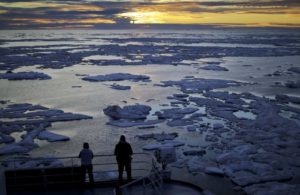
Researchers look out from the Finnish icebreaker MSV Nordica as the sun sets over sea ice in the Victoria Strait along the Northwest Passage in the Canadian Arctic Archipelago. The occasional extreme late-summer storm can be quite damaging to the ice. (Photo credit: David Goldman, Associated Press Archives)
As we head into the second half of August the days are noticeably shorter. That change is even more dramatic in the polar regions where the summer ice melt season is nearing its end.
This year’s melt has been particularly dramatic, with the Arctic sea-ice extent likely heading to its lowest level since satellite measurements began in 1979. The previous low extent record was set in 2012.
The sea-ice is subject to a number of different processes that can force its melting in summer. A good deal of those processes are tied to the progression of late-summer storms over the ice.
Though most such storms are too weak to do excessive damage to the ice, the occasional extreme late-summer storm can be quite damaging for two reasons. First, the extreme storms have very strong winds associated with them and those winds can break up the ice edge through the action of large waves. The resulting small rafts of ice easily melt away in the surrounding water.
Second, the storms have extensive cloud canopies associated with them. The composition of these clouds — whether they are mostly liquid water droplets or ice crystals -– has a large impact on the amount of radiation they emit toward the ice. Liquid water clouds emit more radiation toward the ice than ice crystal clouds and therefore contribute to more melting.
Whether a cloud canopy is mostly liquid water or ice crystals may be directly related to the way in which the storm itself is generated. At UW-Madison we are getting involved in a project that seeks to take measurements in the Arctic in the summer of 2021 to learn more about these interesting and impactful storms.

